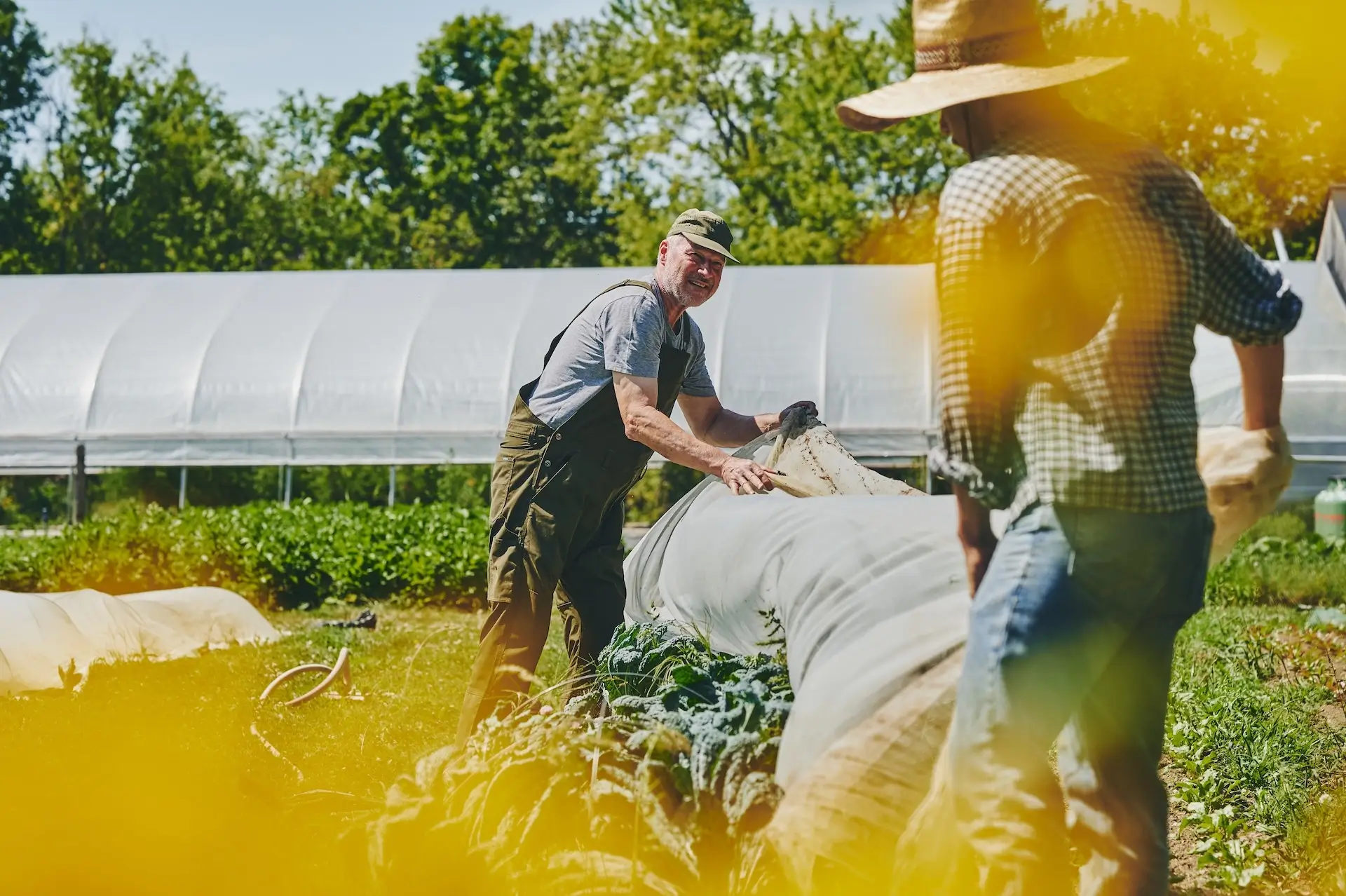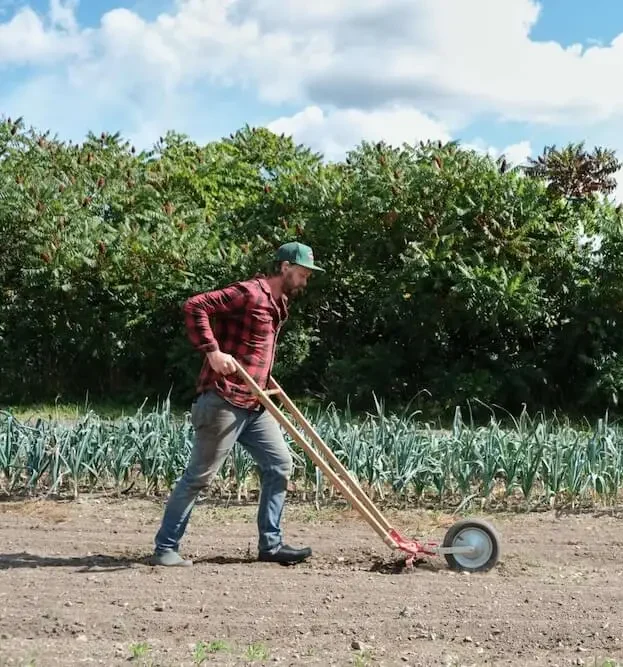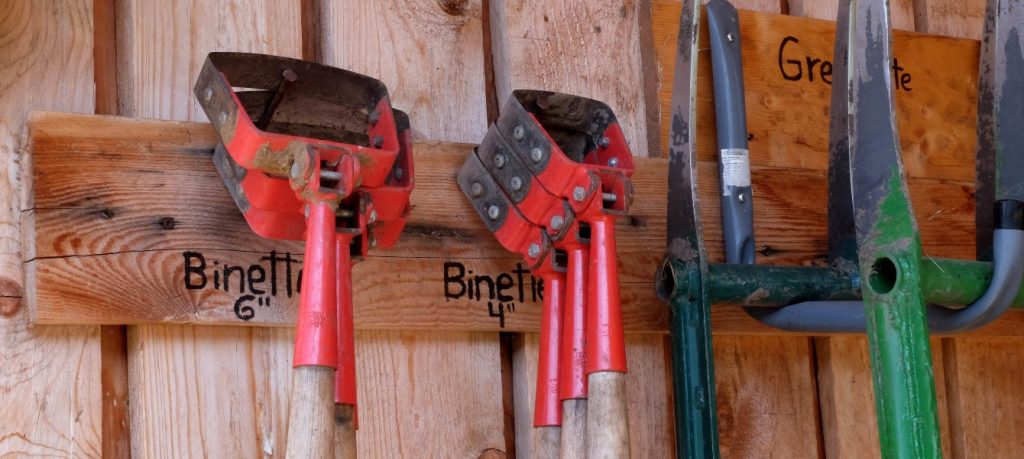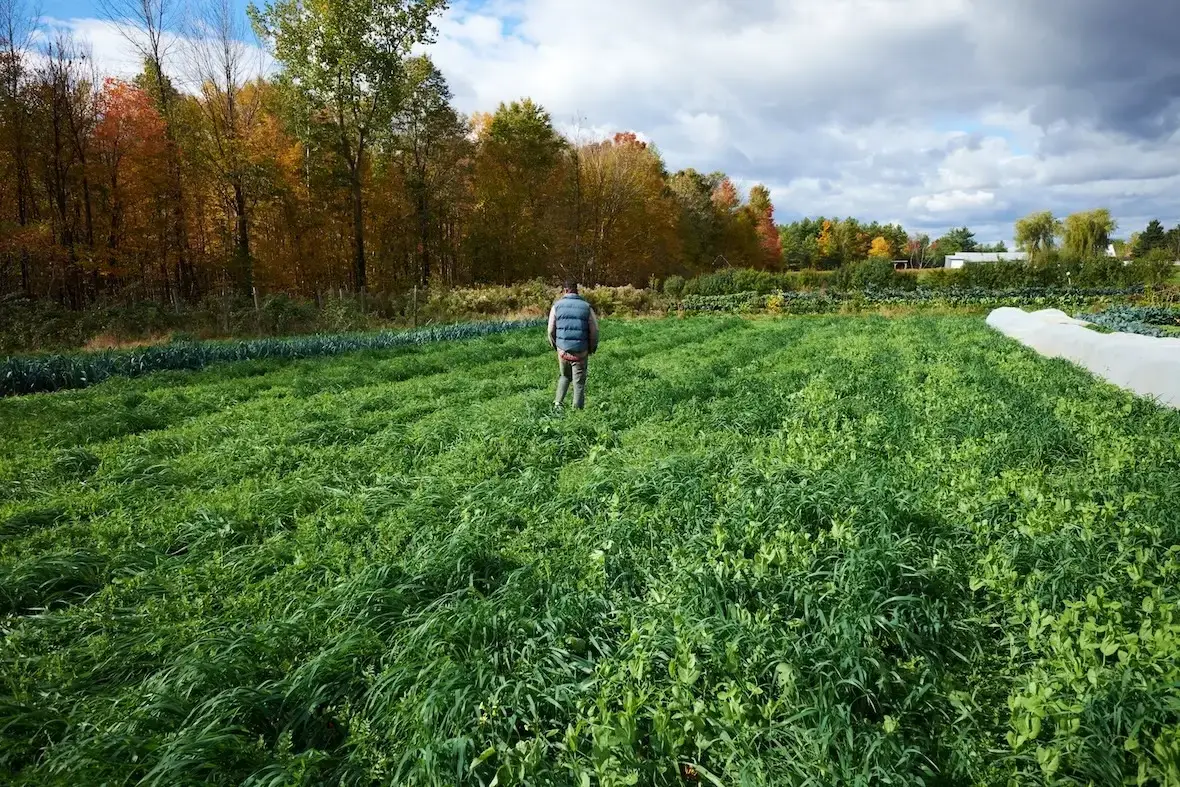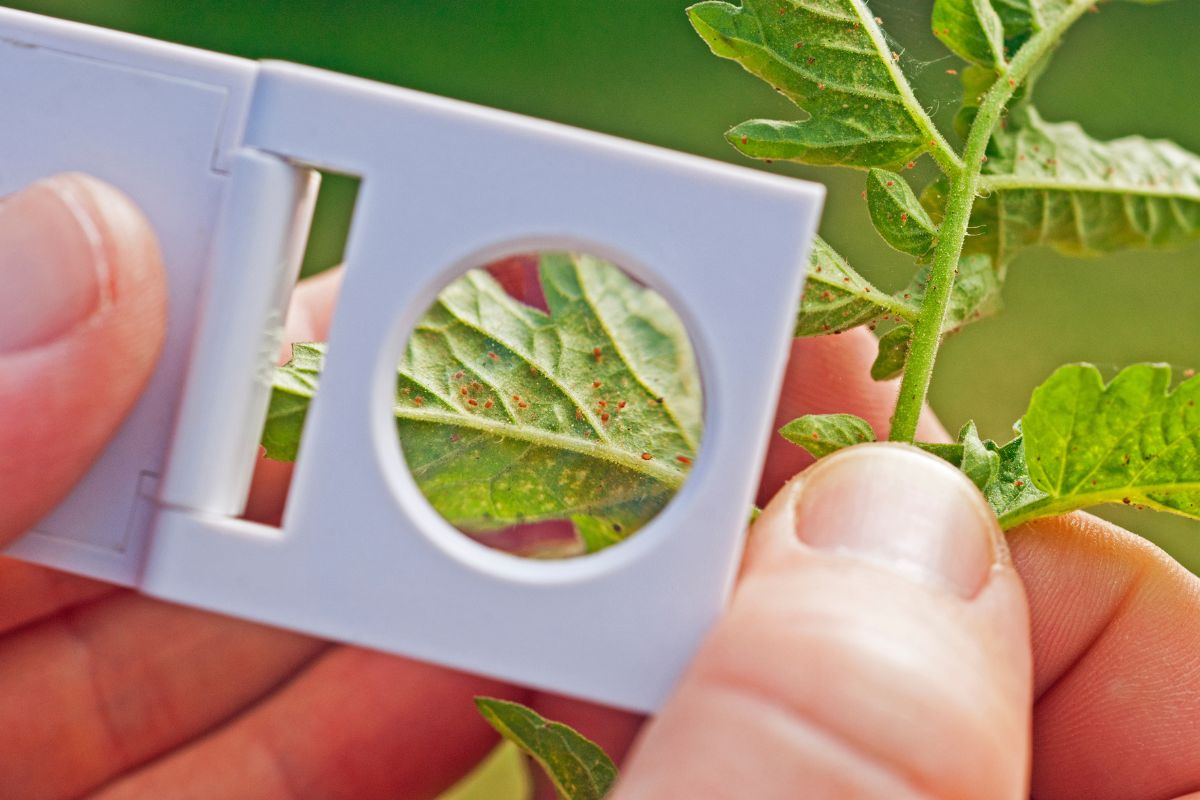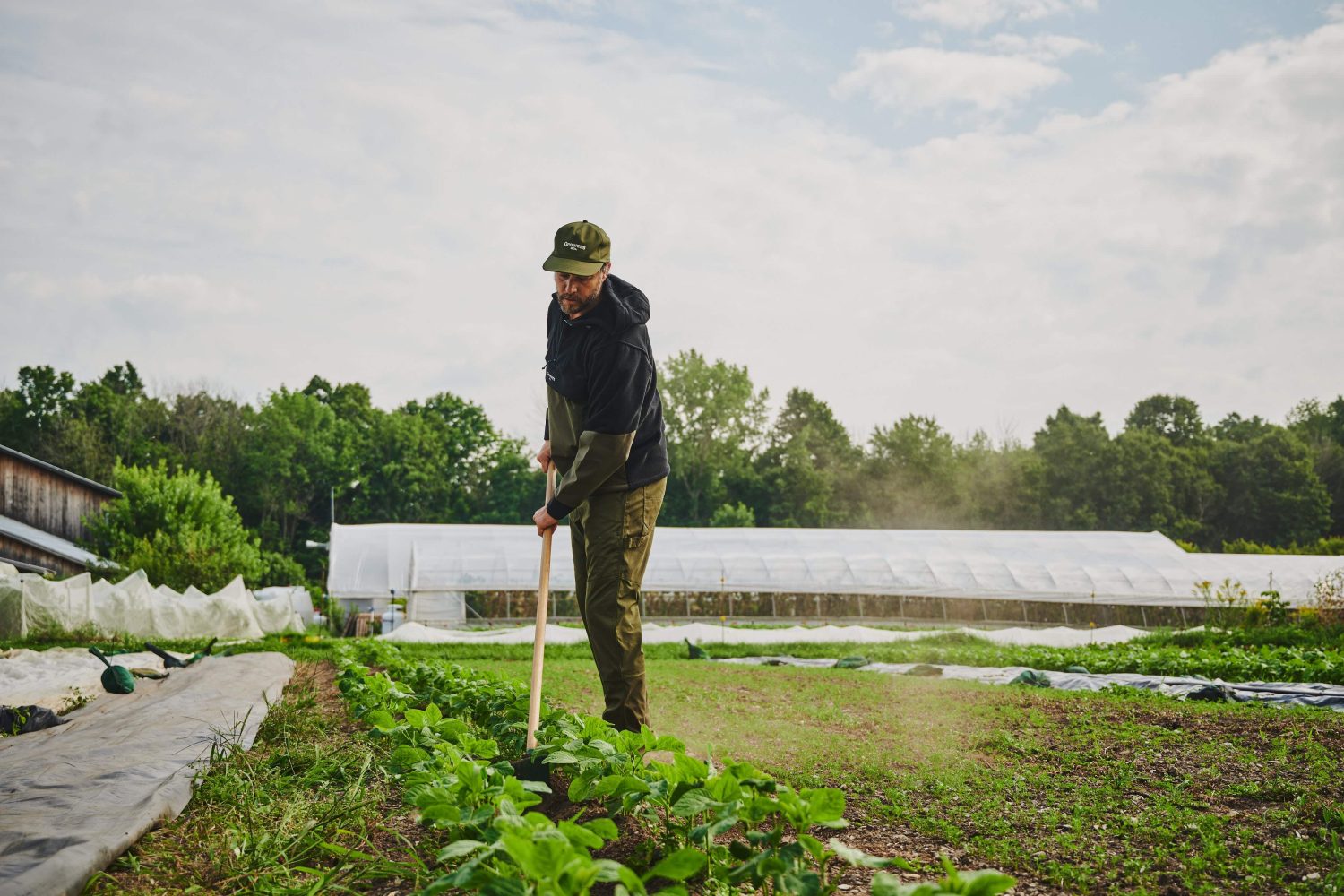Using quality tools on your farm involves necessary and sometimes costly investments. We can all agree that the right tool can tremendously speed up the work, saving both time and money. Learning how to take care of your farm tools is just as important as finding the right tools for your farm. However, many other priorities of farming can often distract us from maintaining upkeep as a regular activity. Here are some principles to keep in mind:
Store Your Tools Properly
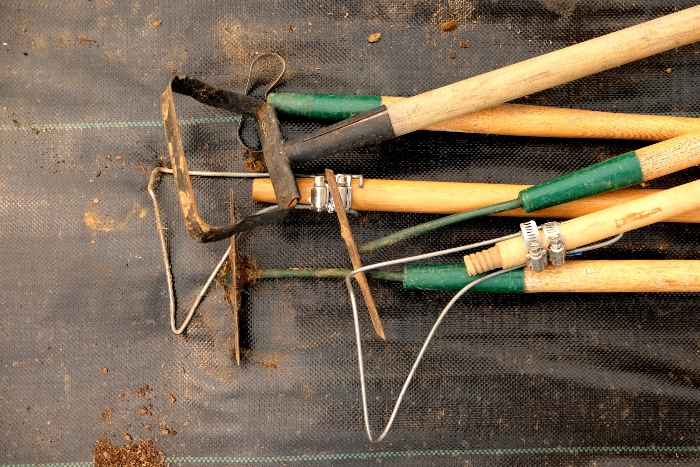
This one might be obvious for some of you out there, but truly, when visiting farms, it’s not uncommon to find hoes or rakes left abandoned on the side of a building. Or even worse, left flat in tall grasses, making them impossible to find. If your tools are left out, particularly in rain or moist conditions, rust can seep in and cause problems that will impact how well they work. In many cases, you’ll end up having to buy something you already had. Which wastes money that could have gone towards other farm investments.
But even worse, searching for a lost tool can cause a lot of havoc and frustration. Moods can quickly sour if you lose ten minutes looking for a missing tool in the midst of a busy day.
“A Place for Everything and Everything in its Place” Jean-Martin Fortier loves this old adage. It’s something he preaches to his farm crew. In French we referred it to as mise en place and it’s pretty self-explanatory. Find a place to properly store each tool, assign an individual place for each tool. Make sure that after each day, those tools are going back to their specific location. That’s it!
This system allows you to always know where things are. It will guide you and/or your farm crew to properly take care of the tools used regularly. Make this a priority – according to Jean-Martin, it will help.
In addition, consider these two storage tips:
- You should hang your tools so that they don’t touch the ground. Hanging tools reduces their exposure to moisture, plus helps to maintain a safe and hazard-free environment. No one wants to accidentally step on a rake!
- Make sure to set up your tool shed in an appropriate location. Ideally it should be in a central area that makes it quick to access your fields. Walking 10 minutes to fetch a tool is burdensome and wastes time. Your tool shed should always be dry, protected and close to your work area.
Keep Your Tools Clean and Develop a Service Schedule
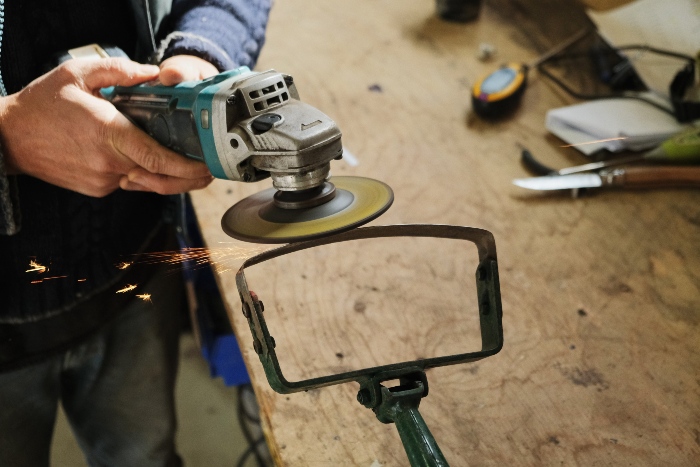
Maintaining your tools is just as important as storing them properly. Taking the time to regularly inspect and take care of your farm tools will allow your investments to last much longer. Consider the following suggestions and integrate cleaning and service tasks into your farm schedule.It will help to ensure that your tools stay in great condition over long-term use.
- After using bladed tools like shears, hoes, or a greens harvester, take the time to remove any remaining soil or debris before putting them away. Soil moisture can cause rust, and it only takes a second to wipe your blade clean, so do this before returning the tool to the shed! If rust starts to appear, cover the metal with a light coat of WD-40 and wipe off with a clean rag.
- Sometimes your rototiller, power harrow or any other implement can be coated with large chunks of soil after use. Make sure to regularly wash them. For this reason alone, it might be a good investment to buy a high-pressure water gun to effectively and quickly rinse off dirt.
- Any tools with wooden shafts also need TLC to ensure they remain in good condition. Before the start of every season, paint them with a protective sealant. Then apply some linseed oil with a clean cloth and let it soak into the handle for 5-10 minutes before wiping it off. This yearly application should keep them moist and soft to the touch (smooth handles = less blisters!). Jean-Martin makes it mandatory for his crew to do this before the start of each growing season. He finds that this process inspires them to be more mindful of caring for the tools. You can reinforced minor cracks on a wooden handle with heavy duty tape.
- For any tools that are motorized (i.e. a tractor, BCS, etc.) the oil level, you should be checking EVERY time you replenish the gas. This routine check should only take a few seconds and can help you avoid permanent damage to the engine(s).
- Maintain a service calendar for implements such as a lawnmower, power harrow, flail mower or any others that need regular lubrication. Implements have grease fittings on them; these are lubricated with multi-purpose grease in a standard zerk-type grease gun. Typically you pump the grease gun until grease is visibly oozing out nearby. In Jean Martin’s experience, pre-planning service time is the only way to not forget about it during the often-far-too-busy growing seasons.
Keep Your Blades Sharp
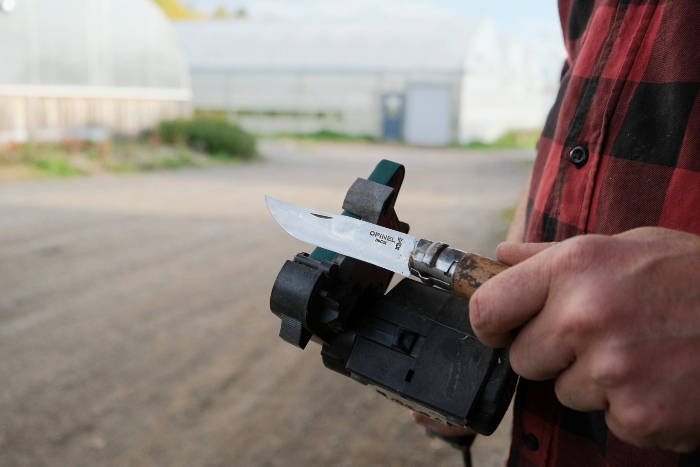
Use sharp tools! One huge way to easily compromise your efficiency is by using dull or semi-broken equipment. Plus, it’s also a major safety hazard! If your tools aren’t sharp enough or aren’t working properly, you could accidentally hurt yourself or waste precious time doing basic tasks such as trimming and harvesting. Sharpen any tools that are used to cut and harvest!
Here are some general tips:
- Harvest knives should always be sharp, and be sharpened before each use. This job is much easier with the Work Sharp MK2 high-speed electric knife sharpener. This isn’t excessive – it’s a simple routine that takes less than a minute. If you have tools that require a bit more time to sharpen, like the blade of the mesclun harvester, you should sharpened them every two weeks.
- You don’t need to set interval for sharpening hoes and other cutting tools. But when needed, wipe the blades down with WD-40 or another lubricant. Uses a bevel sharpening file to file at a 20 to 45-degree angle and follow that by using a sharpening stone.
Tool maintenance is important!
Overall, keep in mind, while none of this should take too long, taking care of your farm tools is an integral component of building sustainability practices for your farm. Whether it’s tool maintenance or approaches to your production, considering how basic tasks can affect your efficiency can really help to make some major differences for your long-term success. Remember, maintaining your tools is just as important as buying the right tools for your farm!
If you’re interested in reading more of our articles about tools (and many other topics), check out the Market Gardener ‘Tool’ section of our blog. Here you can learn more about how Jean-Martin sets up his toolshed and all of his other farm management strategies.


